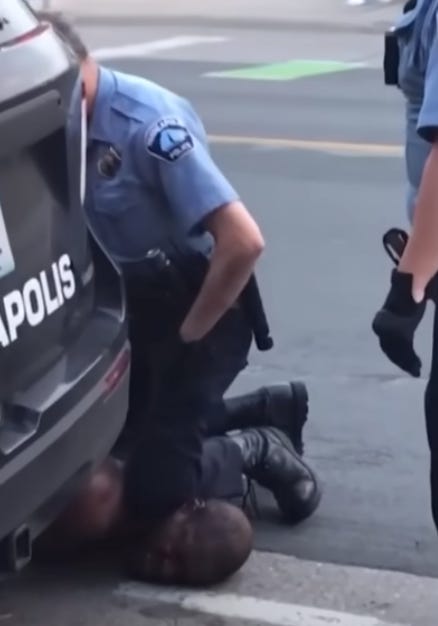An Ode to the Unhyphenated American (Part 5)
A breakdown of Stephen Wolfe's speech at the New Christendom Press Conference
Part one of this series is here:
The video of Stephen Wolfe’s full remarks is here:
So as examples of this—Derek Chauvin with his knee on George Floyd—requires all of us to reflect on our involvement and complicity in racism. Meanwhile, Daryl Brooks—you may not even know that guy's name—a black man who drove through the Waukesha Christmas parade in 2021, killing six white people—including eight year old Jackson Sparks—Jackson Sparks, a boy marching with his baseball team…
Will we take to the streets over it? Are we willing to notice at all or even denounce? No. This murder is just a crazy individual representing nothing but herself; however, the very few instances of whites murdering blacks occasions our national reflection.
Firstly, the framing of the response to Daryl Brooks’ crime is false. There was no lack of media noting that Brooks is black and his victims white, including many people speculating that Brooks drove through the parade in response to the 2020 shooting of three men in Kenosha, Wisconsin, by Kyle Rittenhouse. Wolfe is repeating a line that many people were pushing when the incident happened, and pretending that a hegemonic narrative of anti-white racism prevented it from happening. Brooks, who displayed clear signs of mental illness when he represented himself during the trial, pleaded no contest to running over his girlfriend weeks before the parade, which also lends significant doubt to the narrative of an endemic racist motivation.
Secondly, make note of the way that Wolfe frames the two incidents. Derek Chauvin had “his knee on George Floyd,” who gets no background information, while we are given more humanizing details on the victims of Brooks. Take a minute to watch the video of Floyd dying. Watch a grown man calling for his mother as his life is slipping from him, and police officers tell him to get up and get in the car, something that is impossible to do with one officer putting a knee on his neck while he’s handcuffed. Most importantly, don’t first look at this tragedy through the lens of race, as Wolfe would have you do. Look at everyone in this video as image bearers.

Instead of covering the long history of police brutality, I’d rather give three brief personal stories:
I was at a dinner party in the late-1990s, sitting across from a L.A. County Deputy Sheriff as he told us that Rodney King got what he deserved. He claimed that officers suspecting someone is high on PCP is enough of a pretense for them to beat him to the degree King was beaten, “for their own protection.”
A white friend of mine, who at the time looked quite hippyish, was pulled over by L.A. County Deputy Sheriffs who had removed their badges. They took him out of his car, handcuffed him, put him in the back of the squad car, took off down the road and then slammed on the brakes, flinging him into the metal cage—it’s called a seat-belt check. They left him on the side of the road, a mile away from his car. I’ll never forget how rattled he was when he showed up to our hangout location right after it happened.
In the mid-2000s, my roommate (who was black) and I were pulled over by local police in our town in the South. Because both of us were originally from Los Angeles, without speaking to each other, we immediately put all of our identification and documentation on the dashboard, rolled down our windows and placed our hands in a visible location. The officer walked up to the car and looked at us strangely. He was incredibly nice to us, informed me that I had made a routine traffic error and then let us go on our way without a ticket. Both my friend and I were scared out of our wits and amazed at how the situation played out—afterwards we talked about how we were both expecting to be held until backup arrived, so they could press against the hood of the police car and, at the very least, run us for warrants. Neither of us had ever had a pleasant interaction with a police officer.
Now that I’m a middle-aged father who no longer has Manic Panic neon hair and multiple piercings, and who doesn’t live in an urban environment, practically all of my interactions with police officers are friendly. Yet, I still physically tense up every time I see a police cruiser in my rear view mirror; there’s a subconscious response that I don’t think I will ever shake. I can affirm, first hand, that the majority of white Americans have no idea of the type of fear that police officers can instill in a populace where everyone has multiple stories of friends and family that have been accosted by them, and in which the officers faced no repercussions. This is not a situation that is solved by statistical analysis, but by an appreciation for well-documented recent history and by compassion. This is what should drive us to give special reflection to incidents like the death of George Floyd. There is no equivocation to be had between private citizens committing acts of violence—no matter their motivation—and abuse of power by the civil magistrate against citizens. Most especially, we should outright reject those who would attempt such equivocation to claim hegemonic narratives oppress white people, as well as those, like New Christendom conference participant Joe Rigney, who attempt to frame such compassion as sin.
I’ll pause here, to allow for that reflection, before moving to Wolfe minimizing the history of lynching.
To be continued…


